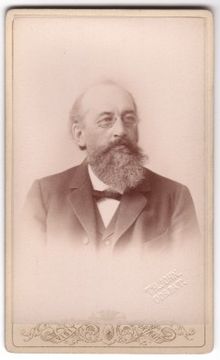Edmund Russow
| Edmund Russow | |
|---|---|
 |
|
| Born | 24 February 1841 Tallinn, Governorate of Estonia |
| Died | 11 April 1897 (aged 56) |
| Nationality | Baltic German |
| Citizenship | Russian |
| Scientific career | |
| Institutions | University of Tartu |
Edmund August Friedrich Russow (24 February 1841 – 11 April 1897) was a Baltic German biologist born in Tallinn (German: Reval), in present-day Estonia.
Son of a military engineer, Edmund Russow studied at the Universities of Tartu (German: Dorpat) and Berlin. In 1867 he became an associate professor at Dorpat, where from 1874 to 1897, he served as a full professor. In 1895-97 he was president of the Estonian Naturalists' Society. Russow was at the forefront of nature conservation in Estonia, and associated with the work of Hugo Conwentz (1865-1922), a founder of nature conservation efforts throughout Europe.
Russow was an authority on Sphagnaceae (sphagnum mosses) and remembered for his research in plant anatomy and histology, in particular studies of the plant family Marsileaceae (aquatic and semi-aquatic ferns). The plant genus Russowia is named in his honor, as is Sphagnum russowii (Russow's sphagnum).
...
Wikipedia
